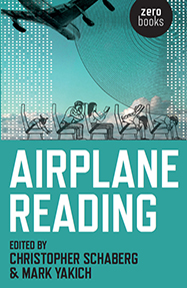The commercial pilot has pretty well completed the transition from hero to robot that Roland Barthes explored in 1955 in his essay “The Jet-Man.” The jetliner itself has lost the appeal that once made its mythology shine. There are no more Spruce Gooses and St. Louis has long since lost its spirit. Today, instead of the pilot or the plane we personify the airline: the rebel Virgin Air; egalitarian Southwest Airlines. Personalities arise out of passengers’ collective experience with an airline, and the way in which the airline markets itself. Today’s airline mythologies revolve around corporate personhood and brand loyalty. It makes sense. Now that air travel is a common, albeit expensive, occurrence prevalent in most people’s lives, and considering that planes are assembly line products and pilots have lost their glory, the passenger is forced to become part of the mythology. Consider a recent ad from Delta.

The Delta mythos would not seem to make good water-cooler conversation. There’s nothing sexy about flying Delta. Their ad is a black and white photograph from a perspective that could easily be that of a passenger boarding the plane. The tail is far back in the frame of the deep focus shot, the row of round-edged rectangular windows in neat alignment leading up to a message painted near where the hypothetical passenger stands: “Wi-Fi on Board.” As if this were not enough, there’s a block of text above the plane that urges us to EXPECT THE INTERNET.
The whole display is business. The plane is grounded; the fonts are non-threatening, memo-friendly fonts. The ad does not jump out at you, but sets you up so that there are no surprises when you board the plane.
But there’s something about this ad that, while not necessarily subversive, seems to suggest a deeper delving into its target audience’s psyche. The paragraph underneath the header reads, “Face it—you need Wi-Fi.” It’s something you “crave,” something you “sniff out in public parks and coffee shops.” While the ad is visually banal, it is trying to scratch underneath the skin of the contemporary passenger. It is a reminder not so much of what other airlines lack, but of what you can’t do without. It presents itself as the back-alley dealer, who says “I got what you need.”
Delta has to do this. Otherwise it accuses its white-collar middle-class customer base of being little more than capital gains. It is reminding you that beneath your very own personal suit and tie or professional dress there are deep, insatiable urges. Without Wi-Fi you get “irritated.” You need to, as they say, “stay connected to the precious, life-giving force that is the Internet.”
The passenger has no urge to break sound barriers, to experience an exponentially growing gravitational pull. The Delta Passenger is above the fray of flight. Flight, until now, has been nothing but a diversion from constant human connectivity. The Delta Passenger is kept on Wi-Fi life support. Now that motion is no longer an “occasional exploit” (in the words of Barthes), but to some a daily routine, the myth is that of the passenger, you, and your significance. How even in flight you must, as the ad says, “keep climbing,” though it never says to where you are ascending.
Stewart Sinclair is a student of literature and creative writing at Loyola University New Orleans.






